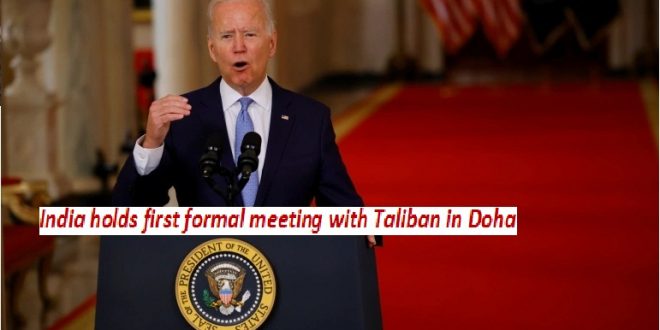01-09-2021
By SJA Jafri + Bureau Report + Agencies
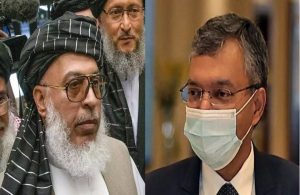 KABUL/ ISLAMABAD/ WASHINGTON/ NEW DELHI/: United States President Joe Biden, in a televised speech, said the US pullout in Afghanistan was the “best decision”, adding that the choice was either to withdraw from the country or escalate the conflict.
KABUL/ ISLAMABAD/ WASHINGTON/ NEW DELHI/: United States President Joe Biden, in a televised speech, said the US pullout in Afghanistan was the “best decision”, adding that the choice was either to withdraw from the country or escalate the conflict.
“I was not going to extend this forever war, and I was not extending a forever exit,” Biden said on Tuesday.
The Taliban declared Afghanistan a “free and sovereign” nation as it hailed the exit of US troops after 20 years of occupation, describing their departure as a “historic moment”.
Taliban fighters on Tuesday took charge of Kabul’s airport as the last US soldiers flew out of the country.
Speaking to reporters from Kabul airport, Taliban spokesman Zabihullah Mujahid said, “We do not have any doubt that the Islamic Emirate of Afghanistan is a free and sovereign nation.”
United States President Joe Biden addressed Americans a day after the last US troops left Kabul, amid domestic and foreign criticism of how he and his administration handled the withdrawal and evacuation of thousands of Americans and Afghans.
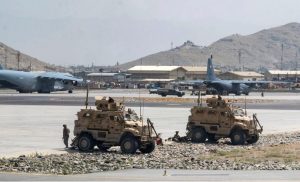 Touting it as the end of “the longest war in American history” during his speech at the White House on Tuesday, Biden first highlighted “one of the biggest airlifts in history” before defending his decision to withdraw by August 31 and how that withdrawal was conducted.
Touting it as the end of “the longest war in American history” during his speech at the White House on Tuesday, Biden first highlighted “one of the biggest airlifts in history” before defending his decision to withdraw by August 31 and how that withdrawal was conducted.
“I believe this is the right decision, a wise decision and the best decision for America,” Biden said.
Transcript of Biden’s remarks
“Last night in Kabul, the United States ended 20 years of war in Afghanistan, the longest war in American history. We completed one of the biggest airlifts in history with more than 120,000 people evacuated to safety. That number is more than double what most experts thought was possible. No nation, no nation has ever done anything like it in all of history. Only the United States had the capacity and the will and the ability to do it, and we did it today.
The extraordinary success of this mission was due to the incredible skill, bravely and selfless courage of the United States military and our diplomats and our intelligence professionals.
For weeks, they risked their lives to get American citizens, Afghans who helped us, citizens of our allies and partners and others on board planes and out of the country. And they did it facing a crush of enormous crowds, seeking to leave the country. And they did it, knowing ISIS-K terrorists, sworn enemies of the Taliban, were lurking in the midst of those crowds.
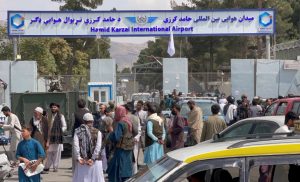 And still, the women and men in the United States military, our diplomatic corps and intelligence professionals did their job and did it well, risking their lives, not for professional gain, but to serve others. Not in a mission of war, but in a mission of mercy. Twenty service members were wounded in the service of this mission. Thirteen heroes gave their lives.
And still, the women and men in the United States military, our diplomatic corps and intelligence professionals did their job and did it well, risking their lives, not for professional gain, but to serve others. Not in a mission of war, but in a mission of mercy. Twenty service members were wounded in the service of this mission. Thirteen heroes gave their lives.
I was just at Dover Air Force Base, for the dignified transfer. We owe them and their families a debt of gratitude we can never repay, but we should never, ever, ever forget.
In April, I made a decision to end this war. As part of that decision, we set the date of August 31 for American troops to withdraw. The assumption was that more than 300,000 Afghan national security forces that we had trained over the past two decades, and equipped, would be a strong adversary in their civil wars with the Taliban that assumption that the Afghan government would be able to hold on for a period of time beyond military drawdown turned out not to be accurate but I still instructed our national security team to prepare for every eventuality, even that one. And that’s what we did. So, we were ready.
When the Afghan security forces – after two decades of fighting for their country, and losing thousands of their own – did not hold on as long as anyone expected, we were ready when they, 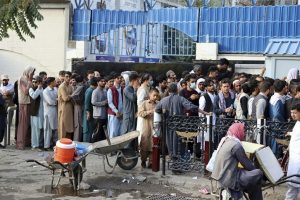 the people of Afghanistan, watched their own government collapse, and the president flee, amid the corruption and malfeasance, handing over the country to their enemy, the Taliban and significantly increasing the risk to US personnel and our allies.
the people of Afghanistan, watched their own government collapse, and the president flee, amid the corruption and malfeasance, handing over the country to their enemy, the Taliban and significantly increasing the risk to US personnel and our allies.
As a result, to safely extract American citizens before August 31, as well as embassy personnel, allies and partners, and those Afghans who had worked with us and had fought alongside of us for 20 years, I had authorized 6,000 troops, American troops to Kabul to help secure the airport.
As General McKenzie said, this is the way the mission was designed: it was designed to operate under severe stress and attack. And that’s what it did.
Since March, we reached out 19 times to Americans in Afghanistan with multiple warnings and offers to help them leave Afghanistan, all the way back as far as March.
After we started the evacuation 17 days ago, we did initial outreach and analysis, and identified around 5,000 Americans who had decided earlier to stay in Afghanistan, but now wanted to leave. Our Operation Allied Rescue ended up getting more than 5,500 Americans out.
Earlier, India’s ambassador to Qatar held talks with a top Taliban leader on Tuesday, the Indian foreign ministry said, the first formal diplomatic engagement since the group took over Afghanistan.
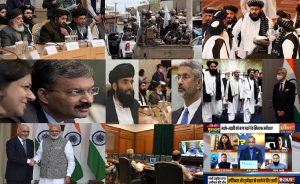 The envoy, Deepak Mittal, met Sher Mohammad Abbas Stanekzai, the head of the Taliban’s Political Office in Doha, at the request of the Taliban, the Indian foreign ministry said.
The envoy, Deepak Mittal, met Sher Mohammad Abbas Stanekzai, the head of the Taliban’s Political Office in Doha, at the request of the Taliban, the Indian foreign ministry said.
The foreign ministry said the two sides discussed the safety of Indians left behind in Afghanistan.
Mittal also conveyed India’s fears that militants could use Afghanistan’s soil to mount attacks against the country, the foreign ministry said.
“The Taliban representative assured the ambassador that these issues would be positively addressed,” the foreign ministry said.
The talks come days after Stanekzai was quoted in the local press as saying that the Taliban wanted political and economic ties with India.
There was no immediate comment from the Taliban on the talks with the Indians.
India invested more than $3 billion in development work in Afghanistan and had built close ties with the US-backed Kabul government. But with the rapid advance of the Taliban, the Indian government was facing criticism at home for not opening a channel of communication 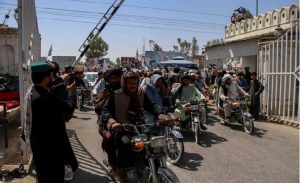 to the group.
to the group.
In June, informal contacts were established with Taliban political leaders in Doha, government sources said.
“Ambassador Mittal raised India’s concern that Afghanistan’s soil should not be used for anti-Indian activities and terrorism in any manner,” the foreign ministry said.
When the Taliban were last in power from 1996-2001, India along with Russia and Iran supported the Northern Alliance that pursued armed resistance against them.
Stanekzai, who Indian officials say received training in an Indian military academy as an Afghan officer in the 1980s, had informally reached out to India last month, asking it not to shut down its embassy, the source said.
 Pressmediaofindia
Pressmediaofindia
